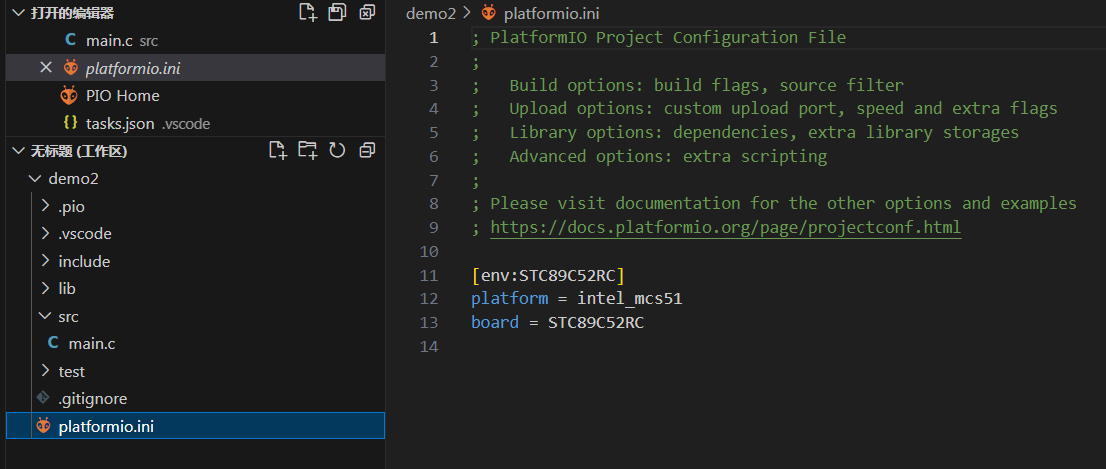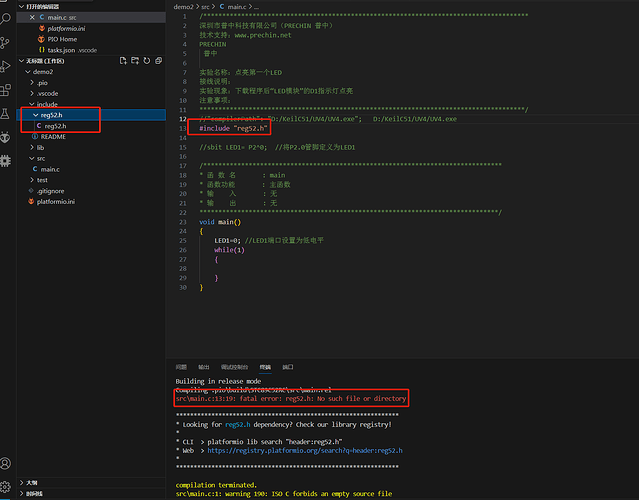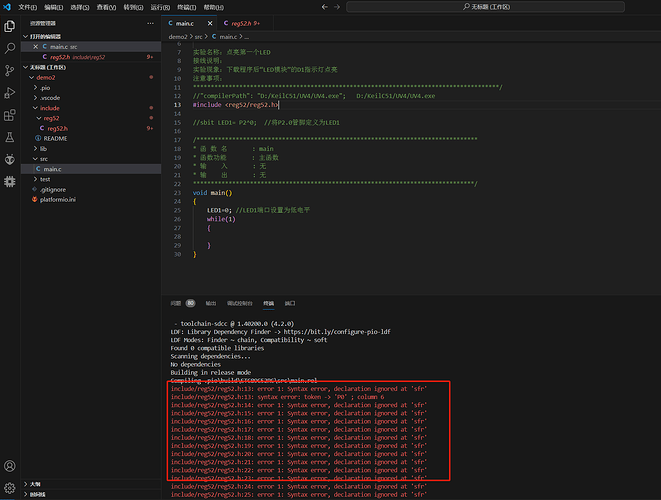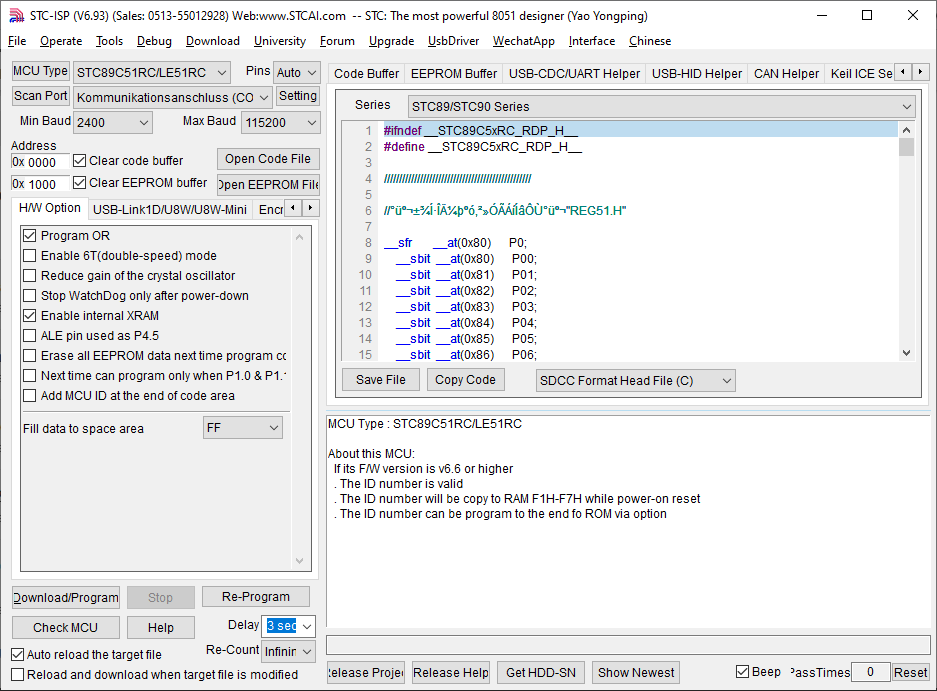STC89C52RC
Automatically using the sdcc compiler, the reg52.h header file could not be called and compiled incorrectly.
Have you tried the stc-blink example with the platformio.ini
[env:STC89C52RC]
platform = intel_mcs51
board = STC89C52RC
? What is the compile error if you try to?
If ypu place the reg52 file in include/reg52.h/reg52.h (weird folder name by the way), and only include is in the include path by default, you must include it with
#include <reg52.h/reg52.h>
Previous attempts to place the reg52.h file in various locations ended up with an error, possibly because the sdcc compiler could not compile the file. So how to switch keil compilation in VScode, and be able to compile the mian.c, build a good 51 compilation environment.
SDCC will not be able to unterstand Keil style implementations. Are you sure it will not work with the reg51.h headeer built into SDCC like the example?
The reg52.h file is copied from the keil5 software, and it is understood that the sdcc compiler cannot compile it. Are there any good alternatives, such as replacing the keil compiler in platformIO?
【用微软免费软件VSC打造单片机开发环境,用起来挺香,比KEIL舒服】用微软免费软件VSC打造单片机开发环境,用起来挺香,比KEIL舒服_哔哩哔哩_bilibili
The latest version of STC-ISP is able to generate a SDCC compatible file for the STC89 series chips.
stc89.h:
#ifndef __STC89C5xRC_RDP_H__
#define __STC89C5xRC_RDP_H__
/////////////////////////////////////////////////
//包含本头文件后,不用另外再包含"REG51.H"
__sfr __at(0x80) P0;
__sbit __at(0x80) P00;
__sbit __at(0x81) P01;
__sbit __at(0x82) P02;
__sbit __at(0x83) P03;
__sbit __at(0x84) P04;
__sbit __at(0x85) P05;
__sbit __at(0x86) P06;
__sbit __at(0x87) P07;
__sfr __at(0x81) SP;
__sfr __at(0x82) DPL;
__sfr __at(0x83) DPH;
__sfr __at(0x87) PCON;
__sfr __at(0x88) TCON;
__sbit __at(0x8F) TF1;
__sbit __at(0x8E) TR1;
__sbit __at(0x8D) TF0;
__sbit __at(0x8C) TR0;
__sbit __at(0x8B) IE1;
__sbit __at(0x8A) IT1;
__sbit __at(0x89) IE0;
__sbit __at(0x88) IT0;
__sfr __at(0x89) TMOD;
__sfr __at(0x8A) TL0;
__sfr __at(0x8B) TL1;
__sfr __at(0x8C) TH0;
__sfr __at(0x8D) TH1;
__sfr __at(0x8E) AUXR;
__sfr __at(0x90) P1;
__sbit __at(0x90) P10;
__sbit __at(0x91) P11;
__sbit __at(0x92) P12;
__sbit __at(0x93) P13;
__sbit __at(0x94) P14;
__sbit __at(0x95) P15;
__sbit __at(0x96) P16;
__sbit __at(0x97) P17;
__sbit __at(0x91) T2EX;
__sbit __at(0x90) T2;
__sfr __at(0x98) SCON;
__sbit __at(0x9F) SM0;
__sbit __at(0x9E) SM1;
__sbit __at(0x9D) SM2;
__sbit __at(0x9C) REN;
__sbit __at(0x9B) TB8;
__sbit __at(0x9A) RB8;
__sbit __at(0x99) TI;
__sbit __at(0x98) RI;
__sfr __at(0x99) SBUF;
__sfr __at(0xA0) P2;
__sbit __at(0xA0) P20;
__sbit __at(0xA1) P21;
__sbit __at(0xA2) P22;
__sbit __at(0xA3) P23;
__sbit __at(0xA4) P24;
__sbit __at(0xA5) P25;
__sbit __at(0xA6) P26;
__sbit __at(0xA7) P27;
__sfr __at(0xA2) AUXR1;
__sfr __at(0xA8) IE;
__sbit __at(0xAF) EA;
__sbit __at(0xAE) EC;
__sbit __at(0xAD) ET2;
__sbit __at(0xAC) ES;
__sbit __at(0xAB) ET1;
__sbit __at(0xAA) EX1;
__sbit __at(0xA9) ET0;
__sbit __at(0xA8) EX0;
__sfr __at(0xA9) SADDR;
__sfr __at(0xB0) P3;
__sbit __at(0xB0) P30;
__sbit __at(0xB1) P31;
__sbit __at(0xB2) P32;
__sbit __at(0xB3) P33;
__sbit __at(0xB4) P34;
__sbit __at(0xB5) P35;
__sbit __at(0xB6) P36;
__sbit __at(0xB7) P37;
__sbit __at(0xB7) RD;
__sbit __at(0xB6) WR;
__sbit __at(0xB5) T1;
__sbit __at(0xB4) T0;
__sbit __at(0xB3) INT1;
__sbit __at(0xB2) INT0;
__sbit __at(0xB1) TXD;
__sbit __at(0xB0) RXD;
__sfr __at(0xB7) IPH;
__sfr __at(0xB8) IP;
__sbit __at(0xBD) PT2;
__sbit __at(0xBC) PS;
__sbit __at(0xBB) PT1;
__sbit __at(0xBA) PX1;
__sbit __at(0xB9) PT0;
__sbit __at(0xB8) PX0;
__sfr __at(0xB9) SADEN;
__sfr __at(0xC0) XICON;
__sbit __at(0xC7) PX3;
__sbit __at(0xC6) EX3;
__sbit __at(0xC5) IE3;
__sbit __at(0xC4) IT3;
__sbit __at(0xC3) PX2;
__sbit __at(0xC2) EX2;
__sbit __at(0xC1) IE2;
__sbit __at(0xC0) IT2;
__sfr __at(0xC8) T2CON;
__sbit __at(0xCF) TF2;
__sbit __at(0xCE) EXF2;
__sbit __at(0xCD) RCLK;
__sbit __at(0xCC) TCLK;
__sbit __at(0xCB) EXEN2;
__sbit __at(0xCA) TR2;
__sbit __at(0xC9) C_T2;
__sbit __at(0xC8) CP_RL2;
__sfr __at(0xC9) T2MOD;
__sfr __at(0xCA) RCAP2L;
__sfr __at(0xCB) RCAP2H;
__sfr __at(0xCC) TL2;
__sfr __at(0xCD) TH2;
__sfr __at(0xD0) PSW;
__sbit __at(0xD7) CY;
__sbit __at(0xD6) AC;
__sbit __at(0xD5) F0;
__sbit __at(0xD4) RS1;
__sbit __at(0xD3) RS0;
__sbit __at(0xD2) OV;
__sbit __at(0xD1) F1;
__sbit __at(0xD0) P;
__sfr __at(0xE0) ACC;
__sfr __at(0xE1) WDT_CONTR;
__sfr __at(0xE2) ISP_DATA;
__sfr __at(0xE3) ISP_ADDRH;
__sfr __at(0xE4) ISP_ADDRL;
__sfr __at(0xE5) ISP_CMD;
__sfr __at(0xE6) ISP_TRIG;
__sfr __at(0xE7) ISP_CONTR;
__sfr __at(0xE8) P4;
__sbit __at(0xE8) P40;
__sbit __at(0xE9) P41;
__sbit __at(0xEA) P42;
__sbit __at(0xEB) P43;
__sbit __at(0xEC) P44;
__sbit __at(0xED) P45;
__sbit __at(0xEE) P46;
__sbit __at(0xEF) P47;
__sfr __at(0xF0) B;
/////////////////////////////////////////////////
#endif
- Thanks to your method, the built-in sdcc compiler can indeed compile normally.
- Can I replace VScode+platformIO with keil compiler and use keil format header files?
Not out of the box. PlatformIO primarily supports GCC and SDCC as the compiler. While it is technically possible to redirect the compiler executable to be clang, Keil or whatever (example), you need to recreate all compiler flags and build steps. I would not recommend that.
Thanks again for your reply



